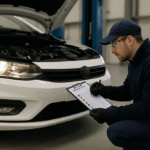A car accident happens in an instant, but the aftermath is often a blur of confusion, adrenaline, and intense stress. It’s a jarring and disorienting experience that can leave even the most level-headed person unsure of what to do, what to say, or where to turn.
The actions you take—and the mistakes you avoid—in the minutes and hours immediately following a collision are critically important. What you do, say, and document at the scene can have a significant and lasting impact on your physical recovery, your financial well-being, and your ability to pursue a successful personal injury claim.
Having a clear, step-by-step plan can help you navigate this chaotic situation safely and effectively, ensuring you protect your health and your legal rights from the very beginning. This guide provides a crucial checklist of what you should do immediately after being involved in a car accident anywhere in Georgia.
Step 1: Prioritize Safety and Get Medical Attention
In the immediate aftermath of a crash, your first and only priority is the health and safety of everyone involved.
- Move to a Safe Location (If Possible): If the accident is minor and the vehicles are operable, the safest course of action is often to move them to the shoulder of the road or a nearby parking lot. This prevents secondary collisions from oncoming traffic. If the vehicles cannot be moved, turn on your hazard lights immediately.
- Check for Injuries: Assess yourself and your passengers for any injuries. Then, if you are able, check on the occupants of the other vehicle(s). Do not attempt to move anyone who is seriously injured unless their immediate location puts them in imminent danger (e.g., from a fire).
- Call 911 Immediately: This is a critical step, even for accidents that seem minor. In Georgia, you are required to report any accident that results in injury, death, or apparent property damage of $500 or more. Calling 911 accomplishes two things: it dispatches law enforcement to create an official police report—a vital piece of evidence for any future claim—and it brings emergency medical services (EMS) to the scene to assess injuries.
- Seek a Full Medical Evaluation: Even if you feel “fine” at the scene, you must get a professional medical evaluation. The adrenaline from a crash can easily mask the symptoms of serious injuries like whiplash, internal bleeding, or concussions. Seeing a doctor at an urgent care center or emergency room as soon as possible creates a crucial medical record that links any injuries you have sustained directly to the accident.
Step 2: Document Everything at the Scene
While waiting for the police to arrive, if you are physically able, you should begin documenting the scene of the accident. Evidence is most powerful when it is fresh.
- Cooperate with the Police: When the officer arrives, give them a clear, factual, and concise statement of what happened. Do not guess, speculate, or embellish. Crucially, do not admit fault. Be sure to get the responding officer’s name, badge number, and the official police report number before you leave the scene.
- Exchange Information: Politely exchange the following essential information with the other driver(s):
- Full Name, Address, and Phone Number
- Driver’s License Number
- Insurance Company and Policy Number
- Vehicle License Plate Number
- Take Extensive Photographs and Videos: Your smartphone is your most powerful evidence-gathering tool. Take more photos and videos than you think you need from every possible angle, including:
- Damage to all vehicles involved (both close-up and wide shots).
- The final resting positions of the cars.
- Skid marks on the road.
- Relevant traffic signs, signals, or road conditions.
- The weather and time of day.
- Any visible injuries you or your passengers have sustained.
- Identify and Speak to Witnesses: If anyone stopped to help or saw the accident happen, ask for their name and contact information. An objective, third-party witness account can be invaluable in proving what happened.
Step 3: Be Extremely Careful What You Say
In the stressful environment of an accident scene, it’s easy to say something that could be misinterpreted later and used against you.
- Do Not Admit Fault: This is the golden rule. Determining legal fault is a complex process. Do not apologize or say things like “It was my fault” or “I didn’t see you.” Even a simple, polite “I’m so sorry” can be used by an insurance company as an admission of guilt.
- Limit Your Conversation with the Other Driver: Beyond exchanging the necessary contact and insurance information, there is no need to discuss the details of the accident with the other driver. Do not get into an argument or debate about who was at fault.
- Do Not Give a Recorded Statement to the Other Driver’s Insurance Company: In the days following the crash, you will almost certainly receive a call from the other driver’s insurance adjuster. They are not on your side. Their job is to protect their company’s financial interests by minimizing or denying your claim. You are not legally obligated to provide them with a recorded statement. You can and should politely decline to do so until you have consulted with an attorney.
Step 4: Report the Accident and Seek Legal Counsel
Once you have left the scene and tended to your immediate medical needs, the next steps involve official reporting and protecting your legal rights.
- Notify Your Own Insurance Company: You should report the basic facts of the accident to your own insurance provider in a timely manner, as required by your policy. Stick to the facts you know.
- Contact an Experienced Attorney Immediately: The insurance claims process is complex and adversarial. The sooner you have a legal expert on your side, the better. Consulting with an experienced personal injury firm like Glenn Cambre Injury Lawyers ensures your rights are protected from the very beginning. An attorney will handle all communications with the insurance companies, launch an independent investigation to preserve crucial evidence, and guide you through the intricate process of building a strong claim.
- Understand Georgia’s Statute of Limitations: It is also important to know that in the state of Georgia, you generally have two years from the date of the accident to file a personal injury lawsuit. While this may seem like a long time, building a compelling case requires time to gather evidence and document the full extent of your injuries. It is essential to act quickly to preserve your legal options.
Frequently Asked Questions
The other driver asked if we could just handle the accident without involving insurance. Is this a good idea? No, this is almost always a very bad idea. The vehicle damage may be far more extensive (and expensive) than it appears, and more importantly, you or the other driver could have injuries that do not become apparent until days later. Without a police report and an official insurance claim, you have no legal or financial protection.
What if the driver who hit me does not have insurance? This is a situation where your own insurance policy is critical. Your Uninsured/Underinsured Motorist (UM/UIM) coverage is designed to cover your medical bills and other damages in a hit-and-run or when the at-fault driver is uninsured. An attorney can help you navigate the process of filing a UM/UIM claim with your own insurer.
I feel fine right now and just have a few bruises. Do I really need to see a doctor? Yes, absolutely. The adrenaline that floods your system during a crash can mask the pain of serious injuries, such as soft tissue damage (whiplash), herniated discs, or even a concussion. Seeing a doctor creates a crucial medical record that documents your physical condition immediately after the crash, which is vital for proving that your injuries were caused by the accident.
When is the right time to contact a personal injury lawyer? The best time to contact a lawyer is as soon as possible after you have addressed your immediate medical needs. The earlier an attorney from a firm like Glenn Cambre Injury Lawyers gets involved, the better they can advise you, protect you from common insurance company tactics, and begin the important work of building a strong case on your behalf.
About Glenn Cambre Injury Lawyers
At Glenn Cambre Injury Lawyers, we understand how overwhelming the aftermath of a car accident can be. We are dedicated to protecting the rights of injured individuals across Georgia, providing the expert legal guidance you need from the very first step. Our commitment is to handle the legal complexities so you can focus on what’s most important: your recovery.
Business Name: Cambre & Associates Injury & Accident Lawyers
Address: 2310 Parklake Dr NE Suite 300, Atlanta, GA 30345
Phone number: (770) 502-6116














